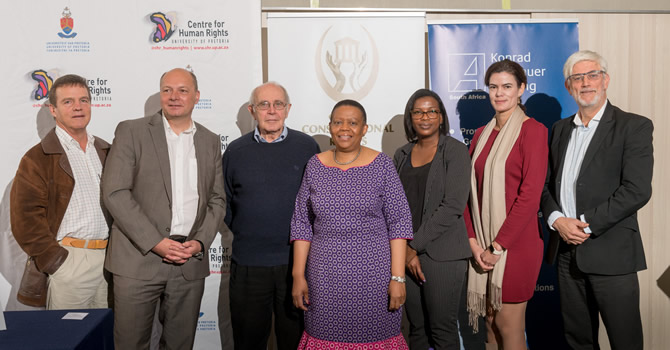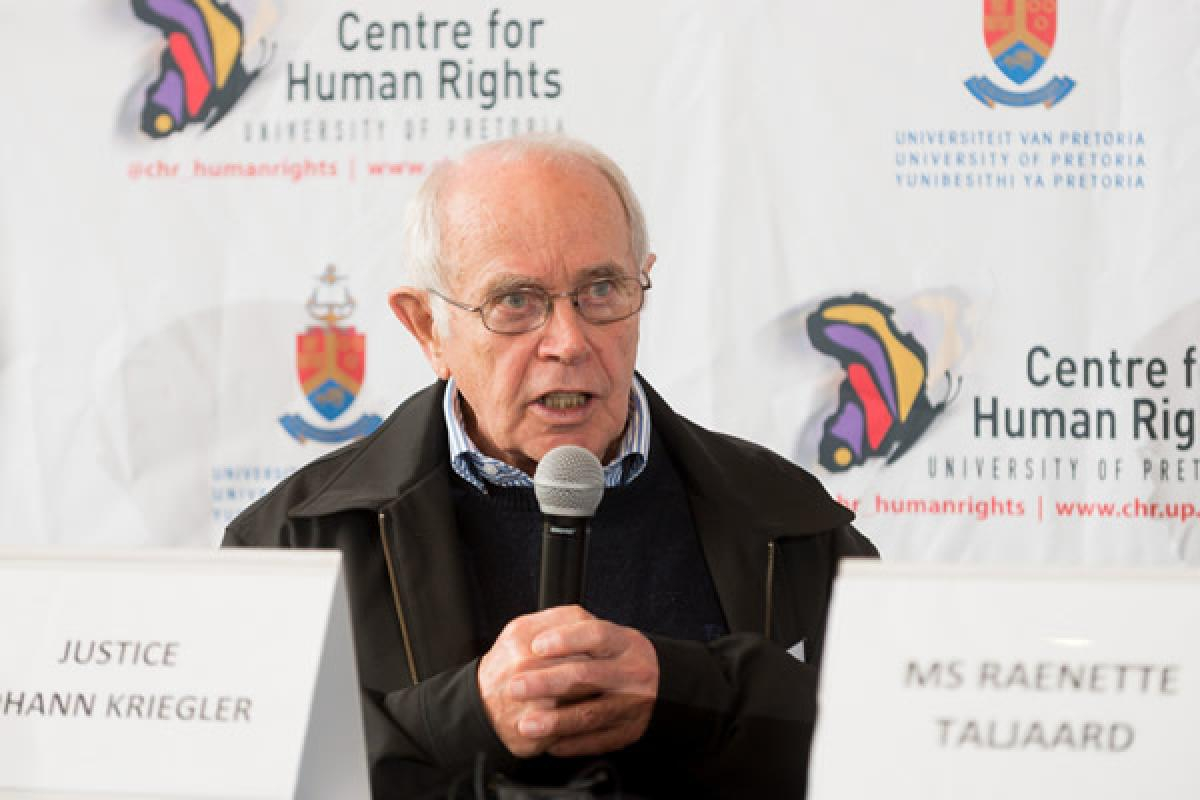The possibility of reforming South Africa’s national electoral systems was the topic of discussion at an event co-organised by the Centre for Human Rights, University of Pretoria, and the Centre for Constitutional Rights. The topic is very timely, in the wake of the recent local elections, with ANC Secretary General Gwede Mantashe recently calling for a debate about desirability of the proportional representation in the electoral system.
![]() Download this press statement in PDF
Download this press statement in PDF
The discussion, which took place over breakfast at the University of Pretoria on 16 August 2016, considered the theme ‘The South African Electoral System, Time to Revisit the Van Zyl Slabbert Report?’. It was supported by the Konrad Adenauer Foundation. The panel discussion was moderated by Advocate Pansy Tlakula, former Chairperson of the Independent Electoral Commission (IEC) and current Chairperson of the African Commission on Human and Peoples’ Rights. The panelists were Justice Johann Kriegler, another former chairperson of the IEC and former judge of the Constitutional Court, and Ms Raenette Taljaard, former Commissioner of the IEC.
The participants agreed that the current electoral system -- even if imperfect -- should not be the primary target of institutional reform. Instead, issues such as the democratic and inclusive culture within the political parties, and the transparency of funding to political parties, need to be more closely scrutinized and reformed. For things to change we need proper civil participation in the elections, extensive voter education, civil education and the meaningful inclusion of the Constitution in the basic educational syllabus.

Dr Theuns Eloff (Executive Director, FW de Klerk Foundation), Dr Holger Dix (Resident Representative, Konrad-Adenauer Stiftung Office, South Africa),
Justice Johann Kriegler (Former Chaiperson of the IEC), Advocate Pansy Tlakula (Former Chaiperson of the IEC), Ms Phephelaphi Dube (Director, Centre for Constitutional Rights),
Ms Raenette Taljaard (Former Commissioner of the IEC) and Prof Frans Viljoen (Director, Centre for Human Rights)
‘If it isn’t broken, do not fix it.’ With this premise, Justice Kriegler addressed the question of proposed electoral reform. His firm view is that the electoral system is not the problem or the cause for our current political malaise. He contended that no one has shown how the proportional representation has produced evils that need to be eradicated. He pointed to the limits of the law as an instrument of social reform. In his view, laws seldom change societal evils – rather, people do. He mentioned the example of Lesotho, where changes to the electoral system did not improve popular discontent with and protest against election results. Justice Kriegler also posed the question what the elections are about, and why they are important. He contended that elections recognize the fundamental dignity of human beings, empowering all citizens above the age of 18 about their civic duty to participate. It is the involvement of the citizens that empowers the citizens, not the government.
A point that was then raised in the audience was that changing the system should start knowing how best to empower the people. We need to be able to contextualize a democracy that will work for South Africa. One cannot just enforce voting if the majority does not know the implications thereof. This is why many people of lower class of our country have stopped voting. The significance of this process is not truly known. People need to be developed and their mindset needs to be changed in order that they may be able to realize that there is actually something wrong.
The crux of Raenette Taljaart’s insight is that when it comes to accountability, it cannot be fixed by electoral reform and that the electoral system is not a silver bullet for the ills of our democracy. The drums around the discourse of the electoral system and that of accountability are however going to grow louder and this is going to confront institutions with very difficult discussions. She also referred to people’s feeling of disempowerment. She revisited the Van Zyl Slabbert recommendations and urged that we engage the principles that were espoused in that report –fairness, inclusiveness, simplicity and accountability – as we debate any change of electoral systems. She expressed the view that the focus of reform should now fall on the culture inside the political parties, which is problematicin all South African political parties.
Adv Pansy Tlakula concluded the meeting, by reminding participants that ours is a society in need of change. The question that should remain with us all is whether the electoral system is the one aspect that has the ability to make this change happen. The answer lies with the people and only the people.
Video
This breakfast discussion was live-streamed on the Centre for Human Rights Youtube Channel and the recording of this event can be viewed here on Youtube. The video is also available below.
